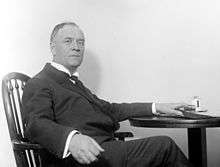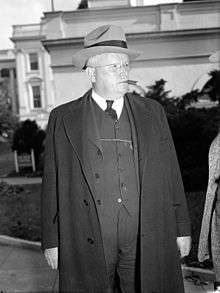Oklahoma Democratic Party
The Oklahoma Democratic Party is an Oklahoma political party affiliated with the United States Democratic Party. Along with the Oklahoma Republican Party, it is one of the two major parties in Oklahoma politics.
Oklahoma Democratic Party | |
|---|---|
 | |
| Chairperson | Alicia Andrews[1] |
| Senate leader | Kay Floyd |
| House leader | Emily Virgin |
| Founded | 1907 |
| Headquarters | 3815 N Santa Fe Ave., Suite 122 Oklahoma City, Oklahoma 73118 |
| Youth wing | Young Democrats of Oklahoma |
| Ideology | Liberalism Progressivism Social liberalism |
| Political position | Center to center-left |
| National affiliation | Democratic Party |
| Seats in State Upper Houses | 9 / 48 |
| Seats in State Lower Houses | 24 / 101 |
| Website | |
| www | |
The party dominated local politics in Oklahoma almost since the days of early statehood in 1907 to 1994. In national politics, the party became a dominant force beginning with the presidential election of 1932 and the Franklin D. Roosevelt political re-alignment. From 1932 to 1994, the majority of members of Congress from Oklahoma have been Democrats, and of the 27 men and women who have been elected to the office of Governor of Oklahoma, 22 have been Democrats.[2]
However, the party has fared poorly since 1994. Democrats lost five out of six congressional races that year and since then have only won a single seat back, only to lose it again in the 2012 election. In response, the traditionally disorganized Oklahoma Democrats have taken steps to create a more organized state party, hiring a professional executive director in 1995.[3] Even so, Democrats continued to lose ground in the 2000s, losing control of both the Oklahoma House of Representatives and the Oklahoma Senate. In 2008, Oklahoma gave the lowest percentage of any state's vote to national Democrat Barack Obama in the presidential election.
As of January 15, 2013, there are 962,072 registered Democratic voters in Oklahoma.[4]
In the 2012 general election, the party was successful in defending all incumbents in the Oklahoma Legislature and defeating two Republican House members.
History
The Oklahoma Democratic Party once dominated state politics for much of Oklahoma history from 1907 to 1994, with its strength in greatest concentrations in the southeastern part of the state, known as "Little Dixie" because of the post-Reconstruction migration of people from southern states such as Mississippi, Texas and Arkansas.[3]
Upon statehood, all but one of the Congressional seats was held by Democrats. The Democrats won eighteen of the twenty-one gubernatorial elections since its statehood in 1907. The Democratic Party held on average 81 percent of the seats in the state legislature between 1907 and 1973.[5] With the onset of the Great Depression, the party gained even more influence for several decades.
The first legislature, dominated by Democratic party members, passed legislation that made it nearly impossible for African-Americans to seek elective office.[6]
Democratic opposition to deficit spending in the late 1930s marked a growing conservative movement in the party, which led to a 1941 constitutional amendment requiring legislators to pass a balanced budget.[7] The growing conservative movement in the party also led to the rejection of many New Deal programs after initial acceptance in the early 1930s.[8]
After the federal Voting Rights Act and congressional reapportionment in Oklahoma in the 1960s, black state lawmakers returned to the Oklahoma Legislature, this time many aligning with the Democratic Party and hailing from Tulsa or Oklahoma City.[9]
Since the 1980s the party has seen a decline as Christian fundamentalists have shifted to the Republican Party. The Democratic Party has not attained more than 41 percent of the vote for president. As of 2000 about 55 percent of Oklahoma voters registered as Democrats.[10] The party continues to decline in strength in both the Oklahoma Legislature and executive branch. For the first time since statehood, Republicans hold all statewide-elected offices starting in 2011.
Current structure and composition
The Oklahoma Democratic Party headquarters is located North Classen Boulevard in Oklahoma City.[11] They host the biennial state conventions in May of odd-numbered years, in which they elect executive officers and delegates to the Democratic National Committee. The Democratic National Committee is responsible for promoting Democratic campaign activities, overseeing the process of writing the national Democratic Platform, and supervising the Democratic National Convention. Delegates serve four-year terms concurrent with presidential elections.
Alicia Andrews became the newly elected chair and first African American and African American Woman chair of the party on June 8, 2019. Dave Ratcliff, the former secretary, was elected vice chair that same year.[12] Former Governor David Walters and Kalyn Free are delegates for the Democratic National Committee.[12]
The state party coordinates campaign activities with Democratic candidates and county parties, and officers who correspond with the state's five Congressional districts. In 2005, the Democratic National Committee began a program called the "50 State Strategy" of using national funds to assist all state parties and pay for full-time professional staffers.[13]
The Young Democrats of Oklahoma is the official age 13-35 division of the Oklahoma Democratic Party.[14]
Officers and Staff
Officers:
- Chair, Alicia Andrews[15]
- Vice Chair, Dave Ratcliff[15]
- Secretary, Tim O'Connor[15]
- Treasurer, Rachel Hunsucker[15]
Staff:
- Executive Director, Scott Hamilton
- Communications Director, Angela Allmond
- Data/IT Director, Andrew Rickel
- Field Director, Stuart Scofield
- Finance Director, Ryan Starkweather
Ideology
The Oklahoma Democratic Party is made up of conservative, centrist and liberal members. Less than a third of registered Democratic voters in Oklahoma supported President Barack Obama in 2012, due to the larger proliferation of conservative and centrist members of the party.[17]
Compared to other Democratic factions, Centrist members of the Oklahoma Democratic Party support the use of military force and the use of deadly force in self-defense. They are more willing to reduce government welfare. Many Oklahoma Democrats are socially conservative by supporting the United States pro-life movement and traditional marriage. The Oklahoma Democratic Party tends to support moderate to conservative positions on gun control and open carry.
The Oklahoma Democratic Party held a state convention on May 14, 2011, in which they discussed a number of platform positions.[18] Participants discussed support for public health programs, government-funded embryonic stem cell research, the legalization of medical marijuana, education funding, and opposition to voucher programs that divert tax dollars to private institutions.[18] They also discussed the state party's support of teacher's rights to unionize and policies to protect homeowners from unfair foreclosures.[18] Other party platform positions included support for the elimination of predatory lending practices, support for limitations on credit card interest rates, support for the elimination of the state sales tax on food, support for increasing taxes on the wealthiest citizens of Oklahoma, and support for reforms to the state criminal justice system.[18] The party's position on gun laws was moderate, stating support for limited, but responsible gun laws.[18] The party also supports continued investments in green energies.[18]
Current elected officials
The Oklahoma Democratic Party holds one of the state's U.S. House seats, and currently hold none of the statewide offices, no majority in either state legislative chamber, and neither of the state's U.S. Senate seats.
U.S. House of Representatives
Legislative leadership
Notable Oklahoma Democrats
- U.S. Senator Thomas P. Gore
- U.S. Senator Robert S. Kerr
- U.S. Senator Fred Harris
- U.S. House Speaker Carl Albert
- Entertainer Will Rogers
Democratic Governors
As of 2020, there have been a total of 22 Democratic Party Governors.
| # | Name | Picture | Lifespan | Gubernatorial start date |
Gubernatorial end date |
|---|---|---|---|---|---|
| 1 | Charles N. Haskell | 1860–1933 | November 16, 1907 | January 9, 1911 | |
| 2 | Lee Cruce | 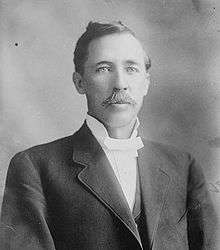 |
1863–1933 | January 9, 1911 | January 11, 1915 |
| 3 | Robert L. Williams | 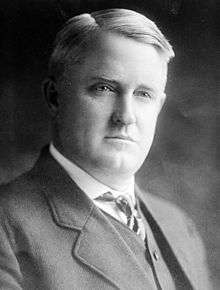 |
1868–1948 | January 11, 1915 | January 13, 1919 |
| 4 | James B. A. Robertson | 1871–1938 | January 13, 1919 | January 8, 1923 | |
| 5 | Jack C. Walton | 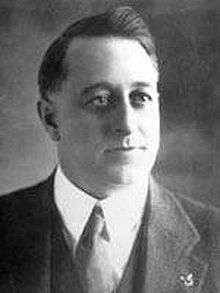 |
1881–1949 | January 8, 1923 | November 19, 1923 |
| 6 | Martin E. Trapp | 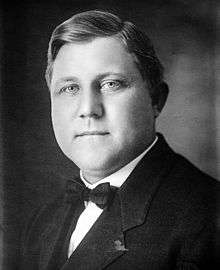 |
1877–1951 | November 19, 1923 | January 10, 1927 |
| 7 | Henry S. Johnston | 1867–1965 | January 10, 1927 | March 20, 1929 | |
| 8 | William J. Holloway | 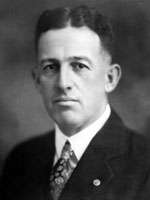 |
1888–1970 | March 20, 1929 | January 12, 1931 |
| 9 | William H. Murray |  |
1869–1956 | January 12, 1931 | January 14, 1935 |
| 10 | E. W. Marland | .jpg) |
1874–1941 | January 15, 1935 | January 9, 1939 |
| 11 | Leon C. Phillips | 1890–1958 | January 9, 1939 | January 11, 1943 | |
| 12 | Robert S. Kerr | 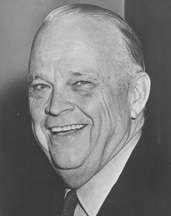 |
1896–1963 | January 11, 1943 | January 13, 1947 |
| 13 | Roy J. Turner | 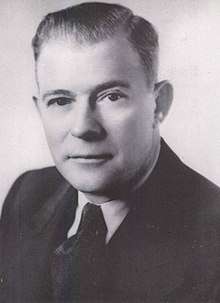 |
1894–1973 | January 13, 1947 | January 8, 1951 |
| 14 | Johnston Murray | 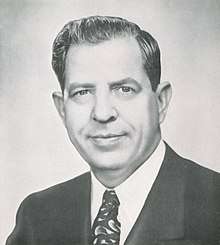 |
1902–1974 | January 8, 1951 | January 10, 1955 |
| 15 | Raymond D. Gary | 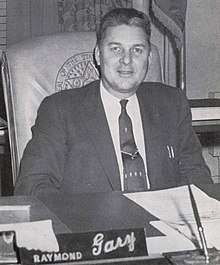 |
1908–1993 | January 10, 1955 | January 12, 1959 |
| 16 | J. Howard Edmondson | 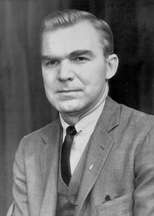 |
1925–1971 | January 12, 1959 | January 6, 1963 |
| 17 | George Nigh |
 |
1927– | January 6, 1963 | January 14, 1963 |
| 20 | David Hall | .jpg) |
1930–2016 | January 11, 1971 | January 13, 1975 |
| 21 | David Boren | 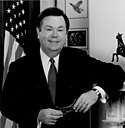 |
1941– | January 13, 1975 | January 8, 1979 |
| 22 | George Nigh | .jpg) |
1927– | January 8, 1979 | January 12, 1987 |
| 24 | David Walters | 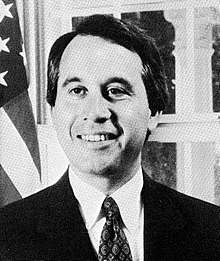 |
1951– | January 14, 1991 | January 9, 1995 |
| 26 | Brad Henry | 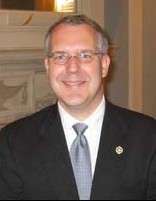 |
1963– | January 13, 2003 | January 10, 2011 |
See also
- Politics of Oklahoma
- U.S. Democratic Party
- Oklahoma Libertarian Party
- Oklahoma Republican Party
References
- https://okdemocrats.org/the-odp-makes-history-again-elects-first-african-american-woman-chair
- Oklahoma Government, Oklahoma Historical Society (accessed February 11, 2010).
- Gaddie, Ronald Keith. Democratic Party, Encyclopedia of Oklahoma History and Culture (accessed February 11, 2010).
- 2013 Registration Report, Oklahoma State Election Board (accessed May 12, 2013)
- Carney, George O., "McGuire, George O. (1865-1930)," Encyclopedia of Oklahoma History and Culture Archived May 31, 2010, at the Wayback Machine (accessed May 28, 2010).
- Bruce, Michael L. "Hamlin, Albert Comstock (1881-1912)" http://www.okhistory.org/publications/enc/entry.php?entry=HA015, Encyclopedia of Oklahoma History and Culture, Oklahoma Historical Society. (accessed April 17, 2013)
- Everett, Dianna. Budget-Balancing Amendment, Encyclopedia of Oklahoma History and Culture (accessed May 11, 2013)
- Bryant Jr., Keith L. New Deal, Encyclopedia of Oklahoma History and Culture (accessed May 9, 2013)
- Franklin, Jimmie Lewis. African Americans, Encyclopedia of Oklahoma History and Culture Archived April 16, 2009, at the Wayback Machine (accessed May 11, 2013)
- Gaddie, Ronald Keith. "Democratic Party." Oklahoma Historical Society. Ed. Nancy L Bednar. Oklahoma Historical Society. Ed. Ronald Keith Gaddie. Web. Nov. 7 2011. http://digital.library.okstate.edu/encyclopedia/entries/D/DE013.html.,
- Contact Us, Oklahoma Democratic Party (accessed February 11, 2010).
- Staff and Officers, Oklahoma Democratic Party (accessed February 11, 2010).
- Gilgoff, Dan (16 July 2006). "Dean's List". U.S. News & World Report. Archived from the original on July 8, 2012. Retrieved April 26, 2007.
- Ydoklahoma.com (accessed May 11, 2013)
- https://okdemocrats.org/state-central-committee
- http://www.okdemocrats.org
- 2012 Election Analysis: Obama and Oklahoma Democrats, Soonerpoll.com (accessed May 11, 2013)
- Baggett, James. "Oklahoma Democrats." 2011 Convention: Rules, Resolutions, Affirmative Action Committee members (two men and two women); to consider proposed Minutes from 2009. Oklahoma Democrats, n.d. Web. 7 Nov. 2011. <http://www.okdemocrats.org 2011-convention-rules-resolutions-minutes-from-2009>.
- http://www.oksenate.gov/senators/biographies/floyd_bio.aspx
- https://newsok.com/article/5615074/emily-virgin-named-house-minority-leader
